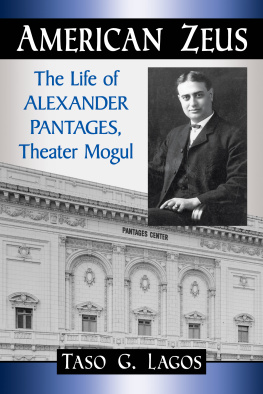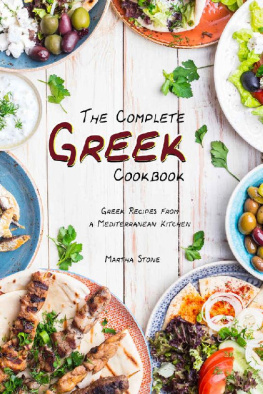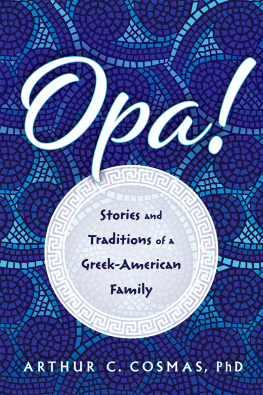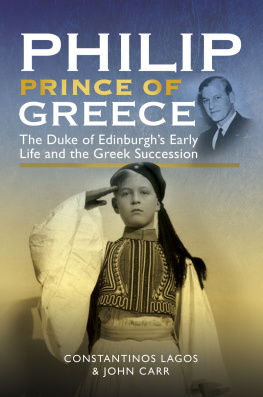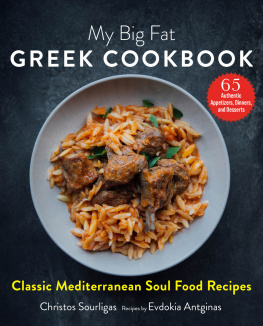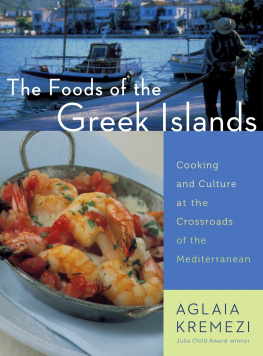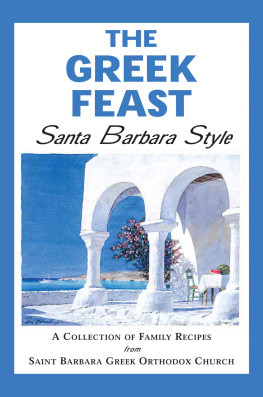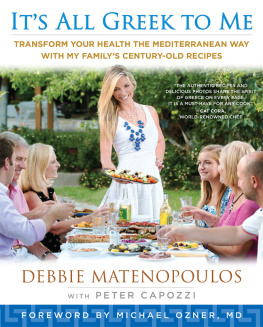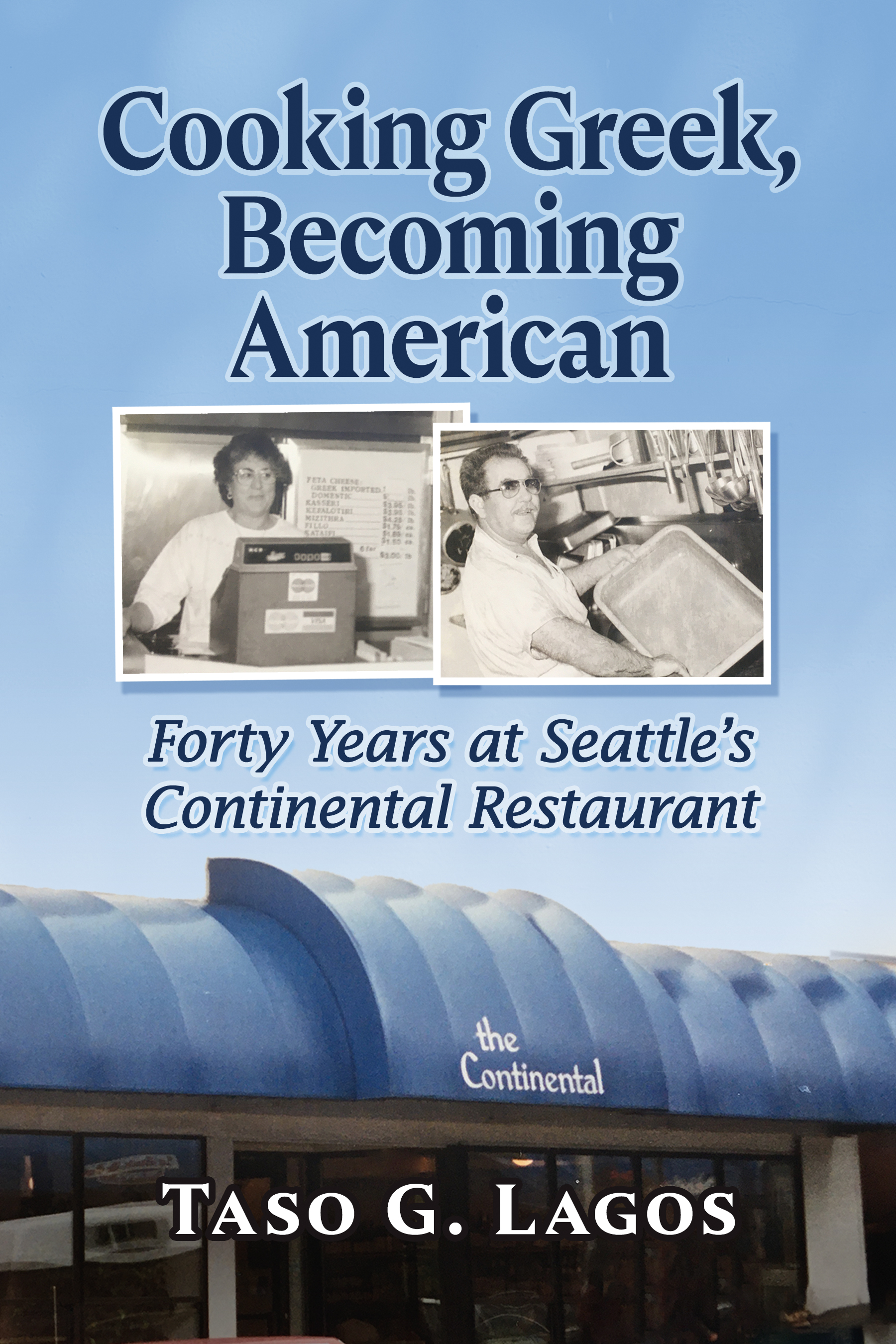Cooking Greek, Becoming American
Also by Taso G. Lagos
American Zeus: The Life of Alexander Pantages, Theater Mogul (McFarland, 2018)
Cooking Greek, Becoming American
Forty Years at Seattles Continental Restaurant
Taso G. Lagos

McFarland & Company, Inc., Publishers
Jefferson, North Carolina
All photographs are from the family collection.
Library of Congress Cataloguing-in-Publication Data
Names: Lagos, Anastasios George, author.
Title: Cooking Greek, becoming American : forty years at Seattles Continental Restaurant / Taso G. Lagos.
Description: Jefferson, North Carolina : McFarland & Company, Inc., Publishers, 2022 | Includes index.
Identifiers: LCCN 2021057754 | ISBN 9781476686523 ( paperback : acid free paper )
ISBN 9781476645520 (ebook)
Subjects: LCSH: Cooking, Greek. | BISAC: COOKING / Individual Chefs & Restaurants | HISTORY / United States / State & Local / Pacific Northwest (OR, WA) | LCGFT: Cookbooks.
Classification: LCC TX723.5.G8 K37 2022 | DDC 641.59495dc23/eng/20211213
LC record available at https://lccn.loc.gov/2021057754
British Library cataloguing data are available
ISBN (print) 978-1-4766-8652-3
ISBN (ebook) 978-1-4766-4552-0
2022 Taso G. Lagos. All rights reserved
No part of this book may be reproduced or transmitted in any form or by any means, electronic or mechanical, including photocopying or recording, or by any information storage and retrieval system, without permission in writing from the publisher.
On the cover: The Continental; proprietors Helen and George Lagos.
Printed in the United States of America
McFarland & Company, Inc., Publishers
Box 611, Jefferson, North Carolina 28640
www.mcfarlandpub.com
To my parents, brother and sister and to the many customers and friends of the Continental who turned place into poetry
Table of Contents
Acknowledgments
Its actually impossible to fully acknowledge the debts owed to make this book possible. Of course, I am deeply grateful first to Natalie Foreman and later to David Alff at McFarland for their belief in this memoir in the first place. There are also my parents, Helen and George Lagos, my brother Demetre Lagos and sister Katerina Lagos-Tsakopoulos to also deeply bow to. There is Doug Campbell of Bulldog News just down the street from the Continental Greek Restaurant and Pastry Shop who should be thanked, if only because he was a constant and unabashed supporter and ultimately a friend.
Yet there are literally hundreds of thousands of customers in the nearly forty years that the Continental existed that also must be thanked, not simply those that walked through our doors, but also the regulars who never stopped coming. There were famous folks, toobasketballer Bill Russell, Gloria Steinem, French film director Luc Besson, and Mary Gates (mother of Microsoft co-founder Bill Gates, Jr.) to name a fewthat graced the small space, as did the Conti super-regulars who sat at the family table almost daily and became friendsRussell Valley, Will Sharp, Michael Maruyama, and many others.
We must also acknowledge the Greek village in Euboea that produced my family and where we were born. This may seem strange, but without that grounding in the village life, where the local cafs provided the glue for the community, the Continental would not have become the social institution that it did. I will say more about this in the following chapters.
And then theres the Continental itself. Its strange to treat a simple shop space as if it were a human being, yet that is my approach, not out of some deluded notion of corporations achieving personhood, an odious concept to me, but rather as a living entity that took on a life of its own; that is, it had a birth, a life and a death. When I decided to approach the book as a biography, after publishing two previous ones, it seemed a natural step to take: to make the place something more than merely four walls, a roof, a kitchen, bathrooms, a tiny office and seating area, but to instead regard it as a regenerative force that left a legacy in the hearts of thousands. It is in that spirit that I must also acknowledge the restaurant as a living member of the local community and one whose loss is still felt today. It is in this spirit that I wrote this book and the same way that the Continental must also be thanked.
I am grateful to the editing work of Brooke Manning; her attention to detail and her outstanding suggestions singularly improved the manuscript. It was her encouragement that convinced me to complete the text as a stand-alone book; originally the memoir was part of a larger historical survey of Greek restaurants in the United States.
To my wife and daughter, who inspired me to continue even when it seemed foolish to do so. This book was not written to boost my academic career, such as it is, but out of a debt I felt to the Continental and its impact on my life, which I only realized in the years that followed its closing. Without Nektaria and Elisabeth there to support me through doubts and insecurities, this book could not have been finished. I am grateful to both. I hope someday that Elisabeth regards this book as my gift to her, so she knows more about her familys life.
Jennifer 8. Lees The Fortune Cookie Chronicles and Lily Chos Eating Chinese inspired me to take my familys Greek American restaurant and turn it into both a narrative (story) and a chronicle (biography) of a business that impacted many lives in the community, most especially my familys. Both books are outstanding examples of emerging chronicles that give voices to immigrants lives in the hospitality industry. For too long immigrants have remained silent in the literature; it is time for these previously silent voices to be lifted.
Perhaps that is the greatest acknowledgment of all.
Preface
It was not a happy day for my family. For several weeks after my brother announced on the restaurants Facebook page that we were selling the Continental and that June 30 would be our last day in it, the disbelief, sadness, and anger raged, and we felt overwhelmed. Nothing in our lives prepared us for such a moment; nothing that had ever transpired in our lives could. This was a unique event, a wake that stretched without end and continues even now as I write these words.
It was eternal death.
We simply were not prepared for the effect of the news about the Contis closing on its legion of regulars and fans. Institution, community center, gathering place, and third place were thrown around almost like machine gun patter, and we had no bulletproof vests to defend its closing or the reasons behind it. The expectation was that my brother would seamlessly take over the operation after my aging parents retired, but after thirty-seven years in the operation Demetre had no will to do so. As the peacemaker in the family, he had done his best to keep the place functioning while dealing with my parents, the employees, the sometimes surly customers, and all the other myriad challenges a small eatery faces. He wanted a break from the long hours, the physical demands of the job, the constant cheerfulness, the squabbles that invariably broke out among the employees, the difficulties of keeping a small business afloat and steady. He really was burned out.
Then there was me. The idea crossed my mind several times a week, but I never felt I had the stomach or inner strength needed to keep the place functioning. I had none of my brothers calm maturity, judgment, and steady competence. I had the creative ideas and big dream visions but lacked the actual daily interest to sustain the restaurant. There were days when I felt up to the challenge, and others, when examining myself honestly, I knew it was above my pay grade. I would have to remain an academic and part-time writer; these milieus were safer and closer to my temperament.


